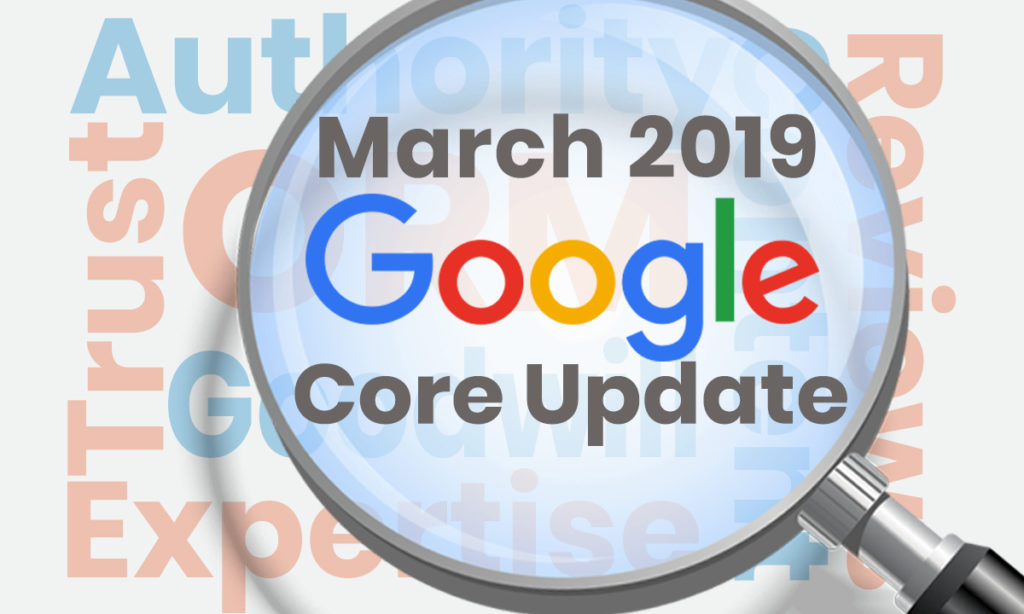On March 12 Google rolled out a major core update that affected many websites across the web worldwide. It seems to be a successor of the August 1, 2018 update (Medic Update) however this time the impact of this update reached sites more broadly and focused on a few new areas. We noticed that most of the sites that recorded improvements or drops in traffic had been previously affected by the August 1, 2018 update (Medic Update) or the September 27 and mid-October updates. Although Google releases a few updates every day to improve quality search results this is one of the largest updates of the year. Google rolls out updates to improve the quality of its search results as measured by user behavior and reduced spamming on the internet.
Google Confirms the March 2019 Core Update
Google has confirmed that this was the first official update of 2019. The update has affected search results and shook the SEO communities.
This week, we released a broad core algorithm update, as we do several times per year. Our guidance about such updates remains as we’ve covered before. Please see these tweets for more about that:https://t.co/uPlEdSLHoXhttps://t.co/tmfQkhdjPL
— Google SearchLiaison (@searchliaison) March 13, 2019
Google has even suggested a name for the update – “March 2019 Core Update”. This information can easily be verified by the Google Search Liaison’s Twitter handle:
We understand it can be useful to some for updates to have names. Our name for this update is "March 2019 Core Update." We think this helps avoid confusion; it tells you the type of update it was and when it happened.
— Google SearchLiaison (@searchliaison) March 15, 2019
What did the March 2019 Core Update Target?
Unlike the Medic Update where Google mainly targeted health-related and financial websites, this time Google’s update affected search results in all major niches around the world. This update was not only limited to E-A-T (Expertise, Authoritativeness, and Trustworthiness) and YMYL (Your Money Or Your Life pages), they also considered ratings (reviews), bounce rate, quality of a website, etc. this time.
What is E-A-T?
E-A-T is Expertise, Authoritativeness, and Trustworthiness.
- Expertise — How knowledgeable content author is on the subject matter they talk about.
- Authoritativeness — The credibility of the website publishing the content. This includes any credentials, outside reviews, testimonials, etc.
- Trustworthiness — Examines how trustworthy the site is. In other words, it means overall site quality and security.
When Did The Update Take Place?
The algorithm change rolled out around March 12 and continued to March 13, 2019. Most of the sites saw uneven traffic changes during this period. Later Google announced the update confirmation on Twitter.
How to Recover from March 2019 Core Update?
Google will keep changing its algorithm regularly to improve search results. This update did not revert the impact of any previous major update like Panda or Penguin updates. It tightened Google’s daily update processes that strives to make their search results and the web more secure for everyone. Google has to do this to keep their monopoly in search as it faces competition from Facebook, DuckDuckGo, and others. As Google continues to advance technology and incorporate artificial intelligent (AI) into its algorithm for search, it will be nearly impossible to get good rankings with poor quality sites or businesses. However, if you continue to maintain a good website and encourage people to review and like your business website, Google will keep your website in its ranking, driving more business to your company. Follow these guidelines and protect yourself from being negatively impacted by any future updates.
Concentrate on the end user or “NATURAL USER CHOICE”
Online Reputations of your Business
Just as in a brick and mortar business, goodwill is key for an online business as well. It creates a long term positive impact on rankings, traffic, and conversions.
Google’s algorithm considers how many people are engaging and trusting your business, your business services, satisfied customers and reviews. Many businesses take this for granted, but you shouldn’t. Reviews help improve search rankings and overall SEO efforts. While there are a lot of factors involved in search rankings, online customer reviews can be a strong signal to communicate trustworthiness and authority to search engines.
Get as many as reviews and ratings as you can get from customers/clients on your website and other platforms like your Google Local Business Listing, Yelp page, Facebook page, etc. including industry-specific review sites. Also reply to any reviews you receive, engaging with users and build trust.
Content Quality:
Is your website content organized for easy use? We know that writing long web content doesn’t always rank; you need to provide quality content. Yes, ONLY QUALITY CONTENT. So, what is quality content?
- The Content: Make sure your content solves the query in detail that the user searched before reaching your page. Make sure to use graphics, videos and other media objects to explain your content better.
- The Author: Ranking also depends on who is writing the content. Ask whether people like to read the content your author writes and see if they are referring to him or her as an expert in the industry. Check to see how active your author is over the web, including social media. It is also better to provide a short author bio with a photo on all posts.
- Frequency of Publishing: Search engines also prefer websites with fresh, regularly updated content. Therefore, if a website publishes content more often than your website, it will rank higher, all other things considered.
- Freshness of Content: Outdated content is also another factor that affects rankings. If you take time to update obsolete content, this will also improve your rankings. This includes product information updates for e-commerce websites.
- User Generated Content: It’s always helpful to encourage users to generate content for your website. This not only helps users understand the topic but also improves rankings and motivates engagement. You can encourage users to ask questions or provide answers, reviews, comments, etc. For e-commerce websites, you can encourage users to generate more content for product pages, which also improves ranking.
- Unique Content: Use Copyscape or another plagiarism discovery tool to check whether your site’s content has been copied from another site. This update continues to penalize duplicate content and reward fresh content.
- Two Sites Instead of One: Many sites hit hardest in this update had split their business into multiple sites, even when there was little differentiation to the user. This strategy was working for the last 18 months but it is no longer a beneficial approach.
Find Out Why Content is King here!
Website Responsiveness and Access:
Over the last few years, Google has been increasing the need for technical SEO for high rankings. It is now very important to ensure your website is or has:
- Mobile friendly
- A valid SSL and is hosted on a secure server
- Minimal website load time
- Easily crawled and understood by search bots and users
- Rich Snippets/AMP techniques
- No redirect chains/loops
- No 404 errors
- No canonical errors
Last but not least, make sure your pages measure better than your competitors. We noticed that many websites dropped in traffic simply because their competitor’s pages have superior quality. It’s good practice to keep an eye on what competitors are doing and make sure your pages answer user’s questions, organize information for easy comprehension, offer the best options, and generally reflect the search terms queried.
If your website was affected by this update, you can contact us. Being a leading Digital Marketing Service Provider in Philadelphia Area, We will be happy to do a FREE analysis if you are a US-based business. Let us help you discover whether your website was affected by the Google March 2019 Core update!
We would also love to hear from you! Just leave a comment and we will be happy to answer!


